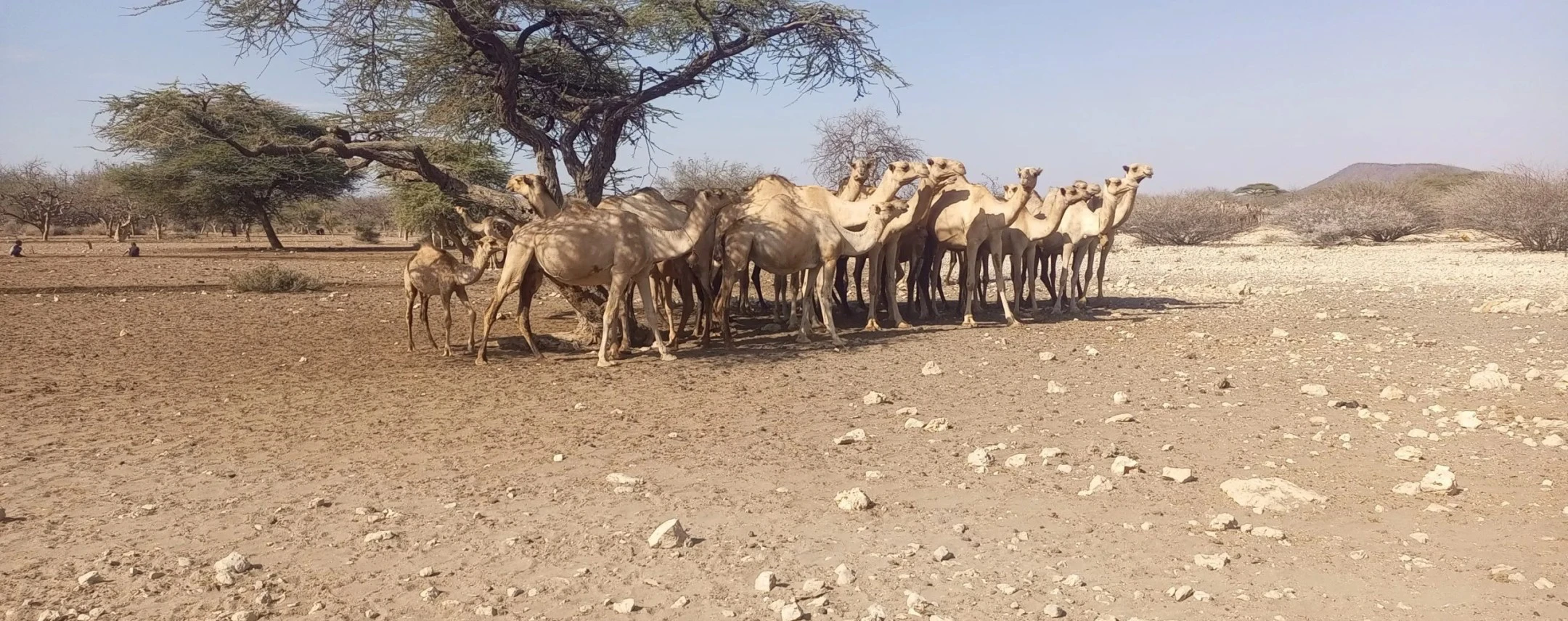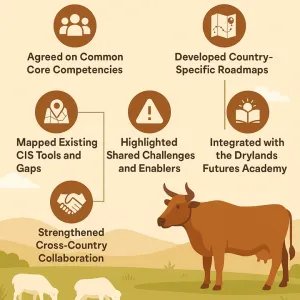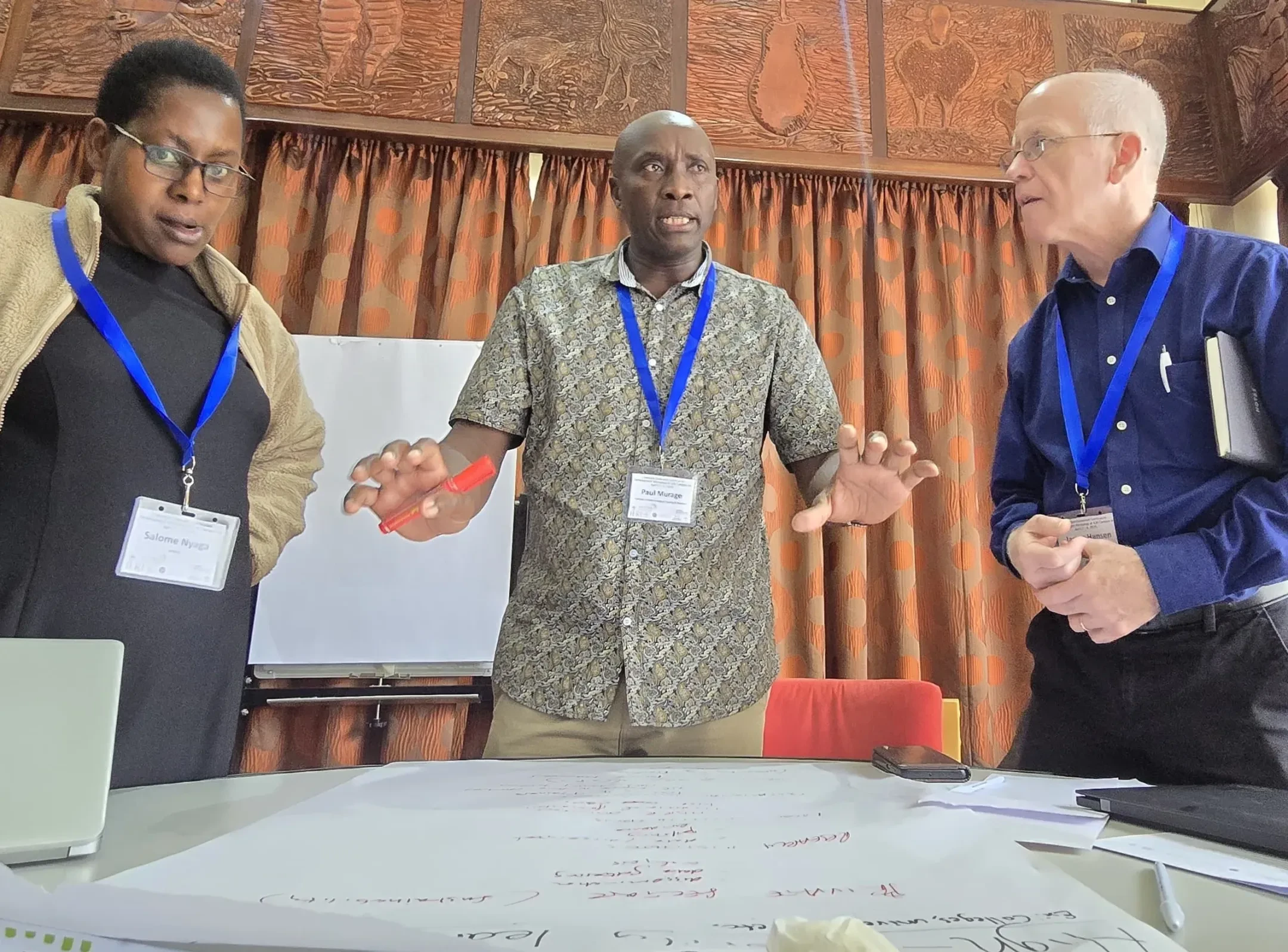On 3 and 4 April, we joined with the ‘Accelerating Impacts of CGIAR Climate Research for Africa (AICCRA) project in a Dryland Futures Academy workshop to develop the livestock component of a Climate Risk Management in Agricultural Extension curriculum.

There is strong demand—particularly in Kenya, Ethiopia, and Senegal—to adapt the Climate Risk Management in Agricultural Extension (CRMAE) curriculum to better support extension and veterinary staff working with livestock systems to access and use climate information.
To meet this demand, a workshop co-organized with the Jameel Observatory for Food Security Early Action in April 2025 supported the harmonization of this curricular adaptation across countries, in coordination with the recently launched Dryland Futures Academy.
Recognizing the importance of ‘next users’, particularly agricultural extension and advisory service (EAS) providers, the workshop contributed to a wider AICCRA effort to co-design curricula targeting the needs of agricultural extension systems in six AICCRA target countries.
The livestock focus emerged from discussions in earlier workshops that called for curricula tailored to extension and development actors working specifically within livestock systems and pastoralists, especially in Ethiopia, Senegal, and Kenya where livestock systems are particularly important for livelihoods, the economy, and nutrition.
Bringing together 30 participants from the three countries, key outcomes of the Dryland Futures Academy workshop were:
- Agreed on Common Core Competencies across Ethiopia, Kenya, and Senegal for livestock-focused extension training, including shared knowledge, skills, and attitudes.
- Mapped Existing Climate Informatuion Services Tools and Gaps for Livestock Systems, identifying both available platforms (e.g., KAZNET) and challenges like limited access or livestock relevance.
- Developed Country-Specific Roadmaps outlining steps for curriculum adaptation, delivery methods, stakeholder engagement, and monitoring strategies.
- Highlighted Shared Challenges and Enablers, such as translation needs, resource limitations, strong policy support, and institutional readiness.
- Strengthened Cross-Country Collaboration amongst government, academic, and grassroots stakeholders, promoting harmonization and peer learning.
- Integrated with the Drylands Futures Academy, aligning future curriculum efforts with a coordinated pan-African framework for dryland resilience education.

During the workshop, country teams gave short presentations, covering:
- Typical climate-sensitive decisions of pastoralists
- The CRMAE curriculum history/context and milestones
- Major capacity gaps and opportunities for agricultural extension working with in livestock systems
- Examples of key existing CIS products, tools, curricula, or approaches targeting the drylands, that could be mainstreamed through extension
- Perspectives on target learners and learning pathways
After country SWOT exercises, the teams worked in groups to identify ‘minimum standards’ of core competencies (knowledge, skills, attitudes) to be addressed in the curricula and a ‘roadmap’ for curriculum co-development and piloting covering: Stakeholder engagement and needs assessment; curriculum adaptation and localization; curriculum delivery channels and learning modalities; monitoring, evaluation, and feedback mechanisms; timelines and milestones; as well as any anticipated roadblocks or enablers of success.
Despite their different geographic, cultural, and institutional contexts, Ethiopia, Kenya, and Senegal share several core competency areas in their Climate Risk Management Curricula for Livestock Systems. These commonalities reflect a shared vision of equipping stakeholders with a robust foundation to manage climate-related risks in livestock systems:
- Knowledge: All countries emphasize understanding of climate impacts on livestock, climate-smart livestock production, and basic principles of pastoralism and rangeland management.
- Skills: Core skills across all three contexts include climate risk assessment, communication of uncertainty, data analysis, and the ability to deliver participatory training and advisories tailored to diverse audiences.
- Attitudes: Respect for indigenous knowledge, cultural sensitivity, inclusivity, adaptability, and a willingness to learn and adopt innovations are consistently valued across the three countries.

More
Meeting report: Grossi A, Borthwick F, Simm G, Worou N, Menéndez M. D. V, Crane T, Belay B, Hansen J. 2025. Harmonizing Climate Risk Management in Agricultural Extension (CRMAE) Curricula Targeting Livestock Systems. Nairobi: AICCRA. https://hdl.handle.net/10568/175292
Presentation: Grossi, A. 2025. Building Enduring Capacity for Resilience in the Drylands: Extension Curricula for Livestock Systems. Presented at Building the Resilience and Prosperity of Pastoralists and Dryland Communities, Nairobi, Kenya, 1-2 October 2025. Nairobi: Alliance of Bioversity International and CIAT. https://hdl.handle.net/10568/176919
Project update: Onyango, P., Grossi, A., Diedhou, L. 2025. Adapting and scaling climate risk management training for livestock systems across Africa. Nairobi: AICCRA. https://aiccra.cgiar.org/news/adapting-and-scaling-climate-risk-management-training-livestock-systems-across-africa
Meeting video: AICCRA. 2025. Adapting and scaling climate risk management training for livestock systems across Africa. Nairobi: AICCRA: https://www.youtube.com/watch?v=VmljLsLH6-o
Project output: Hansen, J. et al. 2025. Climate Risk Management in Agricultural and Livestock Extension – Kenya Reference Guide. Nairobi: AICCRA: https://hdl.handle.net/10568/177646